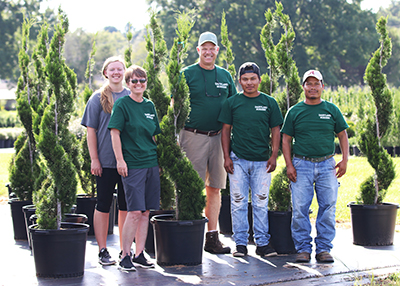Twisting Things Up – Topiary On The Rise

Getting out of the dairy business didn’t mean less work for Mark Williams and Julie Williams. They dug into the nursery industry one shovelful at a time and never looked back.
“It seemed the hard work followed us from one adventure to another,” said Mark, 52. “Relationships are key in the nursery business. I was surprised how many contacts from the dairy industry followed us to the nursery industry.”
Dairyland Nursery started in 2000 as an 11-acre traditional nursery that morphed into a six-acre spread specializing in spiral-cut topiary trees — one of the few in the state to do so.
Mark said growing topiaries takes patience, attention to detail and a vision when shaping the trees. Trees are around three years old before their first trim.
“The most crucial part of shaping topiary is the first cut to shape the tree,” Mark said. “That sets the pattern for future tree growth.”
The Grand Bay resident was the sole sculptor of the topiary plants when the nursery opened. After business rebounded from the 2008 economy bust, Moxie and Oscar Baustistia were hired to help keep it growing. It didn’t take them long to pick up the art of pruning, which is done without a pattern.
Julie said knowing how many trees to plant is challenging.
“We always try to guess how many to plant,” she said, pointing to over 1,000 topiary plants at the nursery. “It seems lately we can’t plant enough to keep up with demand. It’s always a gamble when you work five years out.”
Growing affordably priced trees helps expand the customer base, said Dairyland customer Jim McCook of Magnolia Landscape Supply in Summerdale.
“Topiary plants can’t be found at a big box store, so we try to meet the niche market here,” McCook said. “Our main customers are individuals looking to spruce up their entryways or add a unique dimension to their yards.”
McCook said Dairyland Nursery-grown topiaries are a long-term investment, adding natural color and greenery to lawns and porches. He sells 7-gallon trees for $100, while 15-gallon topiary plants are $200.
Mark attends the Gulf States Horticultural Expo every January to meet new customers and highlight his unique product.
“Our biggest challenge has been becoming known for our products,” Mark said. “People want to know what the trees look like before they buy, but once they trust us, they allow us to pick out their plants.”
Mark and Julie said they never imagined topiary becoming as in-demand as it is today.
“It is an honor to know people want to buy something that we have spent time to hand carve and nurture for five years,” Julie said. “Knowing that we can make others happy makes me happy.”
